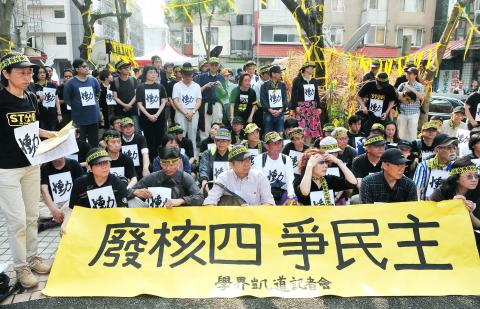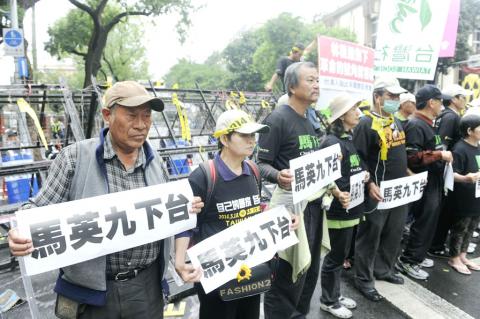About 100 academics yesterday staged a silent march from Ketagalan Boulevard in front of the Presidential Office Building to Gikong Presbyterian Church, where former Democratic Progressive Party chairman Lin I-hsiung (林義雄) has been on a hunger strike since Tuesday, to urge the government to give up nuclear energy.
“Nuclear power is the most negative product of capitalism and imperialism, it’s a disaster for the disadvantaged,” said Cheng Fei-wen (鄭斐文), an associate professor of sociology at Tung Hai University.
“When nuclear disaster occurs, it is the poor, the aged and children who will suffer the most. Even today, the Tao people on Orchid Island still suffer from nuclear waste storage,” he added.

Photo: Chien Jung-fong, Taipei Times
National Chung Cheng University professor Chen Ruey-lin (陳瑞麟) said Taiwan was located in the so-called “Ring of Fire,” where frequent earthquakes and volcanic eruptions occur in the basin of the Pacific Ocean.
“I don’t think Taiwan is qualified to use nuclear energy,” he added.
Nuclear disasters have occurred in many countries with advanced nuclear technology, such as the former Soviet Union, the US and Japan, Chen said.

Photo: Chen Chih-chu, Taipei Times
“It’s difficult for the government to convince us that we can do better than those countries,” the professor added.
“Nuclear disasters take different forms each time they happen. We cannot foresee them coming and there’s no way we can implement a preventive measure that would be 100 percent safe,” Chen said. “This is why I think we shouldn’t take the risk at all.”
Taiwan Association of University Professors president Lu Chung-chin (呂忠津), who teaches electrical engineering at National Tsing Hua University, said the government should not continue to threaten the public by saying that there may be a power shortage without the Fourth Nuclear Power Plant.
“It would be better if the government could use this critical time to develop a green energy system for our future,” he said.
The group marched in silence to the church after tying yellow ribbons with the slogan: “Stop the Fourth Nuclear Power Plant; return the power to the people” on police barricades that barred them from getting close to the Presidential Office Building.
Separately yesterday, another group of antinuclear activists urged the government to respond positively to Lin’s demands, otherwise, Taiwan Society North chairman Chang Yeh-shen (張葉森) said, “the moment that Lin collapses will be the moment the revolution starts.”
Meanwhile, in an effort to force legislators to take a stance, Alliance of Referendum for Taiwan convener Tsay Ting-kuei (蔡丁貴) yesterday afternoon called on supporters to blockade every exit of the Legislative Yuan in a bid to prevent legislators and governmental vehicles from leaving the premises.
The action caused clashes between security and the protesters.
In the midst of the scuffles, Chinese Nationalist Party (KMT) Legislator Alex Tsai (蔡正元) was filmed ordering his chauffeur to drive off the premises, while two protesters were clinging to the hood of his car.
Video footage was uploaded by an individual who was severely critical of Tsai, labeling his order to drive away to be as heinous as an act of hit and run.
Tsai responded on Facebook by branding the gathered groups “rioters” who used clubs to crack car windshields.
The “rioters” climbed on to the hood of his car and initiated violence by hammering the vehicle, he added.
Additional reporting by Tseng Wei-chen

Nipah virus infection is to be officially listed as a category 5 notifiable infectious disease in Taiwan in March, while clinical treatment guidelines are being formulated, the Centers for Disease Control (CDC) said yesterday. With Nipah infections being reported in other countries and considering its relatively high fatality rate, the centers on Jan. 16 announced that it would be listed as a notifiable infectious disease to bolster the nation’s systematic early warning system and increase public awareness, the CDC said. Bangladesh reported four fatal cases last year in separate districts, with three linked to raw date palm sap consumption, CDC Epidemic Intelligence

Two Taiwanese prosecutors were questioned by Chinese security personnel at their hotel during a trip to China’s Henan Province this month, the Mainland Affairs Council (MAC) said yesterday. The officers had personal information on the prosecutors, including “when they were assigned to their posts, their work locations and job titles,” MAC Deputy Minister and spokesman Liang Wen-chieh (梁文傑) said. On top of asking about their agencies and positions, the officers also questioned the prosecutors about the Cross-Strait Joint Crime-Fighting and Judicial Mutual Assistance Agreement, a pact that serves as the framework for Taiwan-China cooperation on combating crime and providing judicial assistance, Liang

The manufacture of the remaining 28 M1A2T Abrams tanks Taiwan purchased from the US has recently been completed, and they are expected to be delivered within the next one to two months, a source said yesterday. The Ministry of National Defense is arranging cargo ships to transport the tanks to Taiwan as soon as possible, said the source, who is familiar with the matter. The estimated arrival time ranges from late this month to early next month, the source said. The 28 Abrams tanks make up the third and final batch of a total of 108 tanks, valued at about NT$40.5 billion

Reports of Taiwanese going missing, being detained or interrogated, or having their personal liberties restricted in China increased about fourfold annually last year, the Mainland Affairs Council (MAC) said yesterday. Last year, 221 Taiwanese who traveled to China were reported missing, were detained and interrogated, or otherwise had their personal freedom restricted, up from 55 the previous year, the council said. Reopening group tours to China would be risky, as it would leave travelers with no way to seek help through official channels after Beijing shut down dialogue between the associations tasked with handling cross-strait tourism, the MAC said. Taipei’s Taiwan Strait Tourism